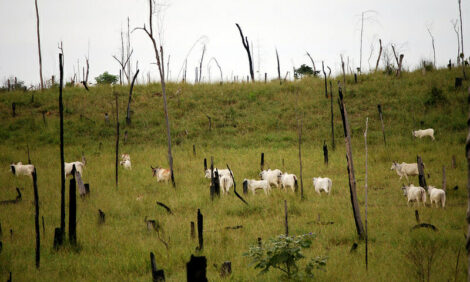



Certified Cattle Bring Higher Proteins To Ranchers
US - A relatively simple procedure that verifies where and when cattle are born could allow ranchers in southern Illinois to trade lower commodity prices for higher premiums according to a recent research project conducted at the University of Illinois.The Processed Verified Program (PVP) for Age and Source verification was suggested to ranchers in southern Illinois as the first of several steps toward adding value to their cattle operations.
"Consumers want to know where cattle come from. It's a trust issue and it needs to start the moment a calf is born," said Camilo Arango Rueda, a graduate student who participated in an internship program at Dixon Springs Agricultural Centre.
"Everyone who works with cattle is moving in this direction to certify using age and source. But just a few of the bigger southern Illinois cattle ranchers are doing it.
"If farmers breeding cattle in southern Illinois implement this certification process, they can sell their cattle to the feeding lots with an average of a $25 premium per head. That price can go from $25 to $80 depending on how they are certified — the simplest one is age and source," he said.
Mr Arango Rueda said the next step is to move toward naturally raised cattle without using hormones or antibiotics.
"Naturally raised cattle get a higher premium because right now the trend is moving toward organic produce and organic production. So, the more natural and organic your cattle have been fed and raised, the higher premiums you can get."
Mr Arango Rueda recommended that farmers start implementing age and source verification now. "It's quite easy. Then start changing some processes within the farm so that in the long run you'll be able to reach these higher certifications. With them, your cattle will be eligible to export to higher-end markets that pay significant premiums like Japan, Korea, and some of the European countries."
Mr Arango Rueda's suggestions were a result of work conducted with researchers Dan Faulkner and Frank Ireland at the U of I Center in Dixon Springs, and Theresa Steckler from U of I Extension. They were looking for ways to add value to cattle producers' operations and to help improve the economy of southern Illinois.
"The work that Mr Arango Rueda did clearly illustrates the value of producers participating in a process verified program," said Mr Faulkner.
After hearing the proposals, the cattle producers from the region were enthusiastic, Mr Arango Rueda said. But they also realised that there may not be enough financial resources for a small producer to take advantage of the higher premiums.
"You need volume. If a producer only has 20 head of cattle, the $25 premium per head is not that significant, but if you add together all of the farmers in the regions, then you're talking about hundreds of thousands of head of cattle, and then it makes sense."
That led Mr Arango Rueda to the concept of developing a cooperative among the producers that could share the costs and labor and allow the members to take advantage of quantity sales. He said that there have been some efforts to apply for a grant to create the cooperative, but at this point the project is on hold.
Although Mr Arango Rueda is currently working on an MBA with a focus in agribusiness at the U of I, he is also a cattle rancher in Colombia, South America so he could identify with the obstacles faced by the southern Illinois producers.
"Hopefully, the farmers will move ahead with the creation of the co-op, and thanks to our project they will have the seeds to implement the programs, and they won't have to start from scratch."


